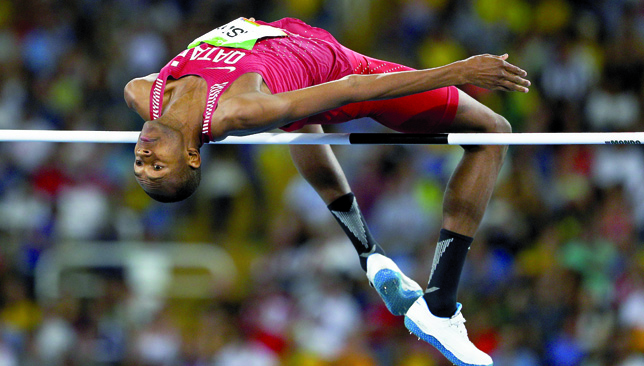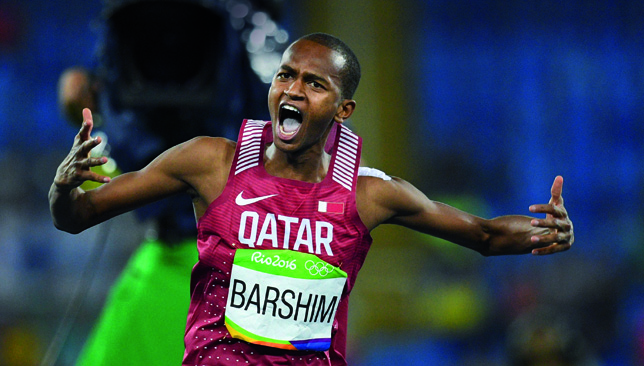
To get an idea of how huge Mutaz Barshim’s silver medal in high jump means for Qatar, you need to look no further than the first few moments of footage of him on the track after he secured second place in Rio late on Tuesday.
As Barshim walked towards his on-track TV interview, he was seen hanging up his phone.
Who was he speaking to? The Emir of Qatar, Sheikh Tamim Bin Hamad Al Thani, who made sure he was the first to congratulate the 25-year-old on bringing Qatar its first-ever silver medal at the Olympics.
It didn’t matter that it was 2:20am in Doha. The Emir was clearly awake and watching.
“The reaction has been crazy,” a laughing Barshim told Sport360 on Wednesday after getting just two hours of sleep.
“Both my phones stopped working, they aren’t really functioning well at the moment, but yes, the Emir called me directly when I was on the track, before I even took my spikes off and he was really happy.
“He congratulated me and he said ‘when you come we’re going to have a celebration’.”
Qatar has been competing at the Olympics since 1984, and up until Tuesday, the Gulf state had just four bronze medals to its name at the Games. One of those was won by Barshim in high jump at London 2012.
This week, Barshim etched his name deeper into the history books by going one better, taking silver with a 2.36m jump in Rio.
In Tuesday’s final, he was bested by the man who shared bronze with him in London – Canada’s Derek Drouin, who cleared 2.38m to become his nation’s first high jump Olympic gold medallist since 1936.
With Qatar often poked at for naturalising foreigners to represent them at global sporting events, the nation can take great pride in the fact that its best performer in Olympic history is Qatari, born, raised and trained in Doha.
“I went into the Olympics gunning for gold. I ended up with silver but I still felt great,” admits Barshim.
“It was a very strong competition. It’s the Olympics after all. I’m very happy and my coach is very happy as well with my performance.”

2016 World-leader: Mutaz Barshim
His coach, Polish-born Swede Stanislaw Szczyrba, is a man who is hard to please.
“Exactly, Stanley is not very easily happy but he was very happy yesterday,” Barshim adds with a chuckle. “It’s the first silver for my country so I’m not just happy for me, it’s mostly about doing this for the people who supported me.
“This time everybody really had my back and I wanted to give something back to them and I’m happy that they’re happy.”
A lot has changed since Barshim placed joint-third at the London Games. He took silver at the World Championships in Moscow in 2013, won the world indoor title in Poland in 2014, before pulling off the second-highest jump in history – a 2.43m that placed him just 0.02m short of Javier Sotomayor’s fabled world record, set in 1993.
All talk suggested Barshim was revolutionising the sport as his 2.40+m jumps encouraged a string of athletes to follow suit.
He shockingly missed the podium at Worlds in Beijing last year, which meant redemption was paramount at the Olympics.
ان شاءالله بكرة النهائي الساعة ٨:٣٠م بتوقيت ريو
— معتز برشم ♕Barshim (@mutazbarshim) August 15, 2016
و٢:٣٠فجرالأربعاء بتوقيت الدوحة.دعواتكم#يلا_قطر#Rio2016 #WhatGravity pic.twitter.com/88bApxNH0F
He entered Rio with a considerable amount of expectation on his shoulders, unlike the case in London 2012. But that pressure did not stop him from having a great time in Rio.
“I would say this time I enjoyed it. Last time I couldn’t,” confessed Barshim. “I couldn’t focus on jumping because I was injured in my back and my focus was just not to hurt myself so I really didn’t enjoy the jumps.
“Of course I was happy with the bronze, under these circumstances it felt like gold but still I did not enjoy the Olympics, I didn’t enjoy going there and jumping and enjoying what I do best.
“But here, I really, really enjoyed it and it was very good. I’m really happy that I was able to put some jumps, so that’s something I’m really happy about.
“Even expectation for me is only more motivation. To see everybody there in the field, Olympic Committee president… for me that’s motivation.”
Despite coming second to Drouin in Rio, Barshim remains the world-leader in high jump and is the only one to clear 2.40m in 2016.
Neither Barshim nor Ukrainian bronze medallist Bohdan Bondarenko were able to match their season-best jumps in Rio, and the Qatari explains why it is a difficult feat to accomplish at the Olympics.
“It’s a little bit different because at the Olympics you have qualification, you have 45 jumpers and then you have to reach the final and then you wait a lot in between. So the result is not really the goal it’s more the medal,” he says.
“When you go to a normal meet, you go there and you have maybe the top eight, very quick goals, more focus, you have better circumstances, your body is more recovered.
“You don’t have to jump qualification and final and wait for 45 guys. So there you can fight for results.”
With his Rio targets now put to bed, Barshim is now free to go for Sotomayor’s 2.45m world record once again after keeping that goal on the back-burner this season.
“I always want to do better. But you have to set certain goals at a certain time. Now I’m more experienced so I wouldn’t make a stupid mistake and just go and jump maximum every time,” he explained.
“So for the Olympics, I prepared myself in a different way, endurance way.
“The world record, I actually erased that from my mind this year since it’s an Olympic year. Next year we’ve got more chances, we’re going to compete in more Diamond Leagues, this is a meet where you can give high performances.
“This year we didn’t focus on any of them, we just took them as training, I didn’t go to a couple of them.
“So next year I’ll go back again and try to jump high records.”
And what about Tokyo 2020, has he thought about that yet or is it too far ahead?
“I think it would be perfect timing for me,” he replies. “But before Tokyo we have the 2017 Worlds, 2018 World Indoors, 2019 World Championships again in Doha and then 2020 Tokyo.
“So it’s going to be really tough and you’ve got to be smart, train wisely, stay fit and stay healthy…
“I always say time, time, time. Time is gold, time is everything. With time you have more experience and you learn. The more mistakes you make the more you learn, the more knowledge you have on how to deal with different situations.”
With bronze in London, silver in Rio, one gets the sense that Olympic gold might finally arrive in Tokyo.